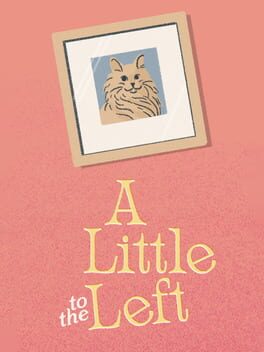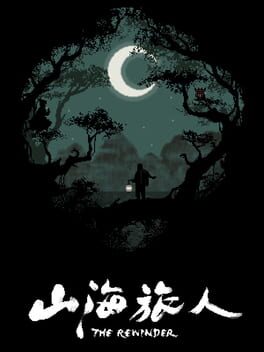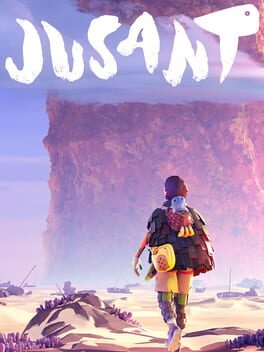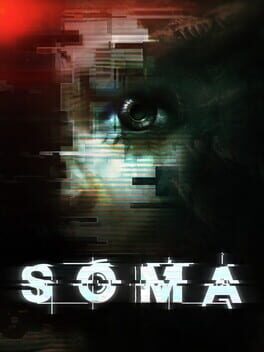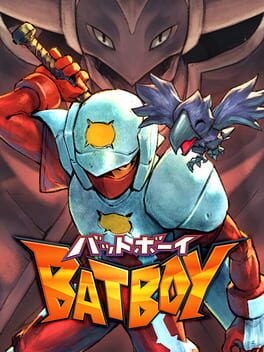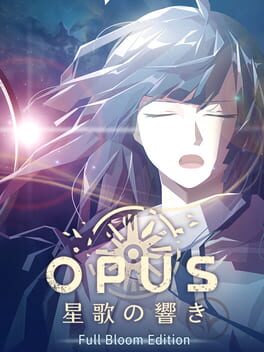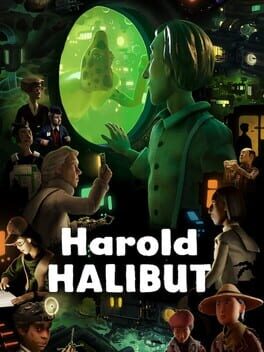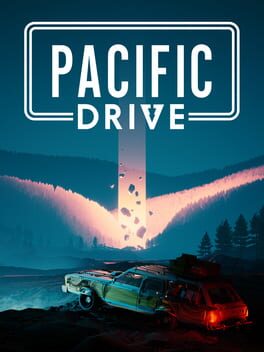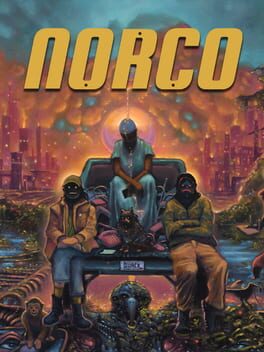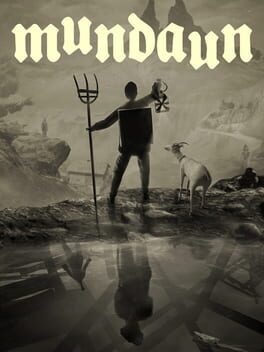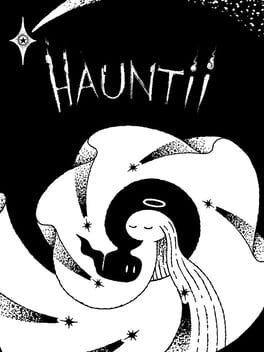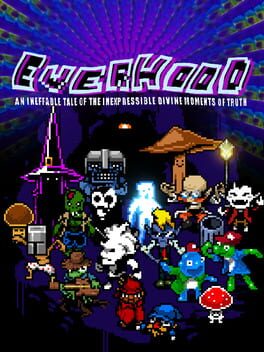Giulianosse
2024
Rain World; Fez; Environmental Station Alpha. If your reaction is "hell yeah" to any of these following games, then you'll love Animal Well.
Decently sized metroidpuzzlevania that rewards exploration and incentivizes the player to tinker and break the game whenever possible. Great movement mechanics, inventive gadgets, fantastic sound design, excellent puzzles and a well-thought map and level design. Minimal handholding is part of the intended experience, but the game does an excellent job of subconsciously guiding us toward breakthroughs and "A-ha!" moments.
Some players will watch the credits roll and feel satisfied while others will spend many more hours unearthing every little secret in the game - and boy there's plenty of them. I feel like I hit a barrier at 52 eggs, and that's perfectly OK.
Decently sized metroidpuzzlevania that rewards exploration and incentivizes the player to tinker and break the game whenever possible. Great movement mechanics, inventive gadgets, fantastic sound design, excellent puzzles and a well-thought map and level design. Minimal handholding is part of the intended experience, but the game does an excellent job of subconsciously guiding us toward breakthroughs and "A-ha!" moments.
Some players will watch the credits roll and feel satisfied while others will spend many more hours unearthing every little secret in the game - and boy there's plenty of them. I feel like I hit a barrier at 52 eggs, and that's perfectly OK.
2021
A simply sublime and inventive deck building game with quite a few genre subversions sprinkled throughout. Masterful atmosphere, visuals and mechanically complex while at the same time being very approachable and digestible. Inscryption should be considered a case study of successful game design.
I gotta admit I was slightly disappointed once the game shifted away from Act 1's shenanigans, but the resulting experience more than made up for it in the end. I also love how the creator added in an optional endgame mode with expanded rules, challenges and cards as kinda of a gift for those who really enjoyed the first segment of the game.
Everyone should play through this at least once. And this is coming from someone who usually dislikes card games and is currently tired of roguelites.
I gotta admit I was slightly disappointed once the game shifted away from Act 1's shenanigans, but the resulting experience more than made up for it in the end. I also love how the creator added in an optional endgame mode with expanded rules, challenges and cards as kinda of a gift for those who really enjoyed the first segment of the game.
Everyone should play through this at least once. And this is coming from someone who usually dislikes card games and is currently tired of roguelites.
2022
Markets itself as a cozy, zen organization game and is everything but. Some puzzles are extremely arbitrary to the point I found myself getting frustrated after having my answers get rejected without any indication whether I was close to the intended solution. The tips are terrible.
If you are looking for an actual relaxing game, steer clear of this one and go play Unpacking or Assemble With Care instead.
If you are looking for an actual relaxing game, steer clear of this one and go play Unpacking or Assemble With Care instead.
2024
A fascinating experiment in visual storytelling and narrative that I'd say is on-par with quite a few respected arthouse movies out there. From the wondrous yet elusive and mysterious steampunk Tsarist Russia to the fever-dream sequences and choices of camera angles, this game goes extremely hard in the cinematography department.
Indika's philosophical backbone is rock solid, positing some intresting reflexions on faith, religion and morality - very well represented by the leveling system, which is the game's only true achievement in gameplay as a ludonarrative device. The ending & its message is also something I won't be forgetting any time soon.
Gameplay, however, is quite janky. Jarring animations, sound mixing that's all over the place, uninteresting transitional setpieces and mediocre puzzles. I never thought I'd say this, but I'd be happier if Indika were even less "game" and more "walking simulator" than what it currently is. Give me more talking and less busywork. I'd have greatly appreciated more delirious sequences and dialogues with the devil.
Still, even though it's far from perfect, I can't help but praise Indika's sheer boldness. Its highs are really high and made me power through the lows. Perfect if you've liked Hellblade.
Indika's philosophical backbone is rock solid, positing some intresting reflexions on faith, religion and morality - very well represented by the leveling system, which is the game's only true achievement in gameplay as a ludonarrative device. The ending & its message is also something I won't be forgetting any time soon.
Gameplay, however, is quite janky. Jarring animations, sound mixing that's all over the place, uninteresting transitional setpieces and mediocre puzzles. I never thought I'd say this, but I'd be happier if Indika were even less "game" and more "walking simulator" than what it currently is. Give me more talking and less busywork. I'd have greatly appreciated more delirious sequences and dialogues with the devil.
Still, even though it's far from perfect, I can't help but praise Indika's sheer boldness. Its highs are really high and made me power through the lows. Perfect if you've liked Hellblade.
2021
Very concise and well-crafted experience. The puzzles were engaging without being too difficult, the narrative had its twists and surprisingly emotional moments. The game respects your time and cut on unnecessary backtracking or exploration. The length was just perfect - not too short and didn't overstay its welcome.
But perhaps the best aspect of The Rewinder is its setting - it's heavily based into Chinese folklore, its mythology and deities. The game deals with this in a very digestible and approachable way, with tons of glossary entries and expositive dialogue which don't feel out of place and helps us (speaking as a westerner myself) get immersed into its rich lore. I love when a media piece allows us a window into the culture and customs of a different people.
The game oozes passion and feels a labor of love. Big props to Misty Mountain Studio!
But perhaps the best aspect of The Rewinder is its setting - it's heavily based into Chinese folklore, its mythology and deities. The game deals with this in a very digestible and approachable way, with tons of glossary entries and expositive dialogue which don't feel out of place and helps us (speaking as a westerner myself) get immersed into its rich lore. I love when a media piece allows us a window into the culture and customs of a different people.
The game oozes passion and feels a labor of love. Big props to Misty Mountain Studio!
2023
A gorgeous game with an extremely inventive and original climbing gameplay system oddly reminiscent of Death Stranding, where each trigger controls the grip on your respective hands. Interestingly enough, the game actually manages to make you physically tired by having to control your character, something I assume was intentional but adds to the experience.
The best way I could describe Jusant is: if Team Ico decided to make an indie game.
The story is told entirely through text logs and environmental details - it's completely dialogueless. Yet it's enticing - and emotional - enough to push you forward till the end. It wasn't until the credits rolled that I finally understood what it was all about.
The game's short enough to not overstay its welcome, but my score would definitely be a little higher if not for the cave chapter, which I felt was a step down both mechanically and thematically from the previous and subsequent chapters.
The best way I could describe Jusant is: if Team Ico decided to make an indie game.
The story is told entirely through text logs and environmental details - it's completely dialogueless. Yet it's enticing - and emotional - enough to push you forward till the end. It wasn't until the credits rolled that I finally understood what it was all about.
The game's short enough to not overstay its welcome, but my score would definitely be a little higher if not for the cave chapter, which I felt was a step down both mechanically and thematically from the previous and subsequent chapters.
2015
Absolutely brainteaser of a narrative that prodded me to question myself, my concepts of consciousness and gave me mild existential crisis at some points. It was the first game in which I needed to take a minute to actually consider the implications of a decision.
The atmosphere is perfect and a big positive if you're a fan of biomechanical horror. The expertly crafted environmental storytelling elements make learning about SOMA's plot a very enjoyable and fluid experience in what may be Frictional's best game in this department so far.
Curiously enough, it also has one of the worst gameplays of Frictional's titles. The monsters operate under very articifical and game-y conditions (the exploration is broken by clearly telegraphed "run and hide" sections and the creatures themselves follow a very on rails behavior).
I actually recommend playing SOMA on the alternate difficulty mode where monsters can't kill you, so you can appreciate the story at your own pace and read all the logs without feeling rushed.
The atmosphere is perfect and a big positive if you're a fan of biomechanical horror. The expertly crafted environmental storytelling elements make learning about SOMA's plot a very enjoyable and fluid experience in what may be Frictional's best game in this department so far.
Curiously enough, it also has one of the worst gameplays of Frictional's titles. The monsters operate under very articifical and game-y conditions (the exploration is broken by clearly telegraphed "run and hide" sections and the creatures themselves follow a very on rails behavior).
I actually recommend playing SOMA on the alternate difficulty mode where monsters can't kill you, so you can appreciate the story at your own pace and read all the logs without feeling rushed.
2023
Bat Boy is basically Shovel Knight with a baseball bat instead of the iconic shovel. You got a classic 8-bit platforming gameplay split up between stages, a plethora of abilities, bosses, optional levels and a health/stamina upgrade mechanic. Sounds cool, right?
Unfortunately, unlike Shovel Knight, Bat Boy's weaknesses show up relatively fast. There's not much incentive to use most of your abilities save for a few of them (the invincibility bubble basically makes every boss and platforming challenge trivial), the story's very so-so, uninteresting cast of characters, meta progression is boring and there's almost no side content or meaningful collectibles.
But the most glaring issue to me was how the game underutilizes its main mechanic: batting. Aside from reflecting projectiles thrown by enemies and into switches, that's basically all there is. For a game with such heavy emphasis on baseball, they should definitely have invested more into this concept.
If you love Shovel Knight like me, perhaps you'll come to like Bat Boy as well for its creative level design filled with different gimmicks, classic platforming gameplay and beautiful pixel graphics. But don't go expecting the same level of polish and brilliantism - otherwise you're bound for disappointment.
Unfortunately, unlike Shovel Knight, Bat Boy's weaknesses show up relatively fast. There's not much incentive to use most of your abilities save for a few of them (the invincibility bubble basically makes every boss and platforming challenge trivial), the story's very so-so, uninteresting cast of characters, meta progression is boring and there's almost no side content or meaningful collectibles.
But the most glaring issue to me was how the game underutilizes its main mechanic: batting. Aside from reflecting projectiles thrown by enemies and into switches, that's basically all there is. For a game with such heavy emphasis on baseball, they should definitely have invested more into this concept.
If you love Shovel Knight like me, perhaps you'll come to like Bat Boy as well for its creative level design filled with different gimmicks, classic platforming gameplay and beautiful pixel graphics. But don't go expecting the same level of polish and brilliantism - otherwise you're bound for disappointment.
A surprisingly well developed universe brimming with intresting lore set in an incredibly grounded setting featuring political strife, interplanetary wars, corporativism and a techno-magical ether/lifeforce known as Lumen. I would totally watch an original series set in the world of Opus. It's fantastical.
It's also bogged down by one of the most aggressively mediocre stories I've ever seen in a videogame. Borderline one dimensional characters who are basically walking anime stereotypes with zero personal growth aside from the final hour and a trope-filled narrative with minimal development.
If you've seen the first scene where the cast is introduced: congratulations, you've already seen it all. The honorable male protagonist with a savior complex and a tendency to apologize for everything he does, the female idealistic pariah with a heart of gold (who's obviously also the MC's platonic love interest) and her sidekick slash adopted protegé - a kid with a troubled past who literally spends the entire playthrough cussing and belittling the protagonist on every dialogue interaction they have. It's as grating as dragging your face through a mile of broken glass. Their motives stay the same throughout the entire game - and you'll be reminded of them quite a few times. Basically all the time.
Hilariously enough, the only character with any semblance of a well written story was the bandit leader known as Bones, who initially shows up as an antagonist and after being unexpectedly saved by the protagonist, gradually comes to term with his own life choices while serving time in prison.
As if the story wasn't bad enough, the gameplay revolves around an absolutely terrible system of RNG encounters, dice rolls and an abysmal resource management mechanic. Your reward for guessing the right outcomes is getting enough money to buy fuel and resources to continue your journey. Your penalty for being unlucky is having to do even more dice rolls... so you can continue doing the aforementioned dice rolls. Exhilarating.
Exploration gameplay gets the job done, you basically walk from point A to point B, but for a game that prides itself so much about its relationship with music, the "puzzles" (if one could even call those sequences as such) are extremely uninteresting and repetitive.
It's a 10h game that would've been infinitely better had it been just an average 3h visual novel. There's some good story there and touching moments ruined by everything else in between.
I only stuck through its entirety because of the raving reviews - after I realized it wasn't getting any better than that, I was already too far so might as well power through the rest - sunken time fallacy and all that. Maybe it's good enough for people who are used to generic, cheesy emotional anime narratives, but for everyone else, there's better games to invest your precious time into.
It's also bogged down by one of the most aggressively mediocre stories I've ever seen in a videogame. Borderline one dimensional characters who are basically walking anime stereotypes with zero personal growth aside from the final hour and a trope-filled narrative with minimal development.
If you've seen the first scene where the cast is introduced: congratulations, you've already seen it all. The honorable male protagonist with a savior complex and a tendency to apologize for everything he does, the female idealistic pariah with a heart of gold (who's obviously also the MC's platonic love interest) and her sidekick slash adopted protegé - a kid with a troubled past who literally spends the entire playthrough cussing and belittling the protagonist on every dialogue interaction they have. It's as grating as dragging your face through a mile of broken glass. Their motives stay the same throughout the entire game - and you'll be reminded of them quite a few times. Basically all the time.
Hilariously enough, the only character with any semblance of a well written story was the bandit leader known as Bones, who initially shows up as an antagonist and after being unexpectedly saved by the protagonist, gradually comes to term with his own life choices while serving time in prison.
As if the story wasn't bad enough, the gameplay revolves around an absolutely terrible system of RNG encounters, dice rolls and an abysmal resource management mechanic. Your reward for guessing the right outcomes is getting enough money to buy fuel and resources to continue your journey. Your penalty for being unlucky is having to do even more dice rolls... so you can continue doing the aforementioned dice rolls. Exhilarating.
Exploration gameplay gets the job done, you basically walk from point A to point B, but for a game that prides itself so much about its relationship with music, the "puzzles" (if one could even call those sequences as such) are extremely uninteresting and repetitive.
It's a 10h game that would've been infinitely better had it been just an average 3h visual novel. There's some good story there and touching moments ruined by everything else in between.
I only stuck through its entirety because of the raving reviews - after I realized it wasn't getting any better than that, I was already too far so might as well power through the rest - sunken time fallacy and all that. Maybe it's good enough for people who are used to generic, cheesy emotional anime narratives, but for everyone else, there's better games to invest your precious time into.
2024
First and foremost: what a visually stunning game Harold Halibut is. Everything is made out of clay models, from characters to backgrounds and props. The game's worth for its visuals alone.
Another big positive is its story. Not narrative, might I say. I'll get in the "howevers" in a while. Its universe feels fresh and thought of, especially the Flumylyn society, language and customs. Harold Halibut is also very wholesome, cozy, optimistic and soulful - it's refreshing to play a game that doesn't use violence, conflict or attrition as its basis. It's a joy to find out more and get yourself acquainted with each of the many intresting characters you'll encounter. Some people had qualms with the protagonist himself, but I didn't mind - his character arc is pretty consistent and defined. Because, while it might not seem at a first glance, it's a game about people, relationships and their sense of belonging.
However, it pains me to say Harold Halibut suffers heavily from pacing issues. I have no problems with slow games, but it is painfully, glacially slow. It has too much backtracking, too much redundant dialogue, too much downtime... which makes it even more puzzling because the good sections are really good (shout-out to the downright genial "Exchange" segment that looks something straight out of Evangelion), but you have to bear through hours of busywork and walking to get there. It's a 5h game stretched into a 14h body. That's the main reason why my score isn't higher.
Still, some story beats - especially its overarching message - are very beautiful and I surprisingly got emotional by the end. As much as Harold Halibut is a terribly bloated experience, you can't help but feel sad when the adventure eventually ends. It has a lingering charm not everyone will appreciate, but for those who do it's great.
Another big positive is its story. Not narrative, might I say. I'll get in the "howevers" in a while. Its universe feels fresh and thought of, especially the Flumylyn society, language and customs. Harold Halibut is also very wholesome, cozy, optimistic and soulful - it's refreshing to play a game that doesn't use violence, conflict or attrition as its basis. It's a joy to find out more and get yourself acquainted with each of the many intresting characters you'll encounter. Some people had qualms with the protagonist himself, but I didn't mind - his character arc is pretty consistent and defined. Because, while it might not seem at a first glance, it's a game about people, relationships and their sense of belonging.
However, it pains me to say Harold Halibut suffers heavily from pacing issues. I have no problems with slow games, but it is painfully, glacially slow. It has too much backtracking, too much redundant dialogue, too much downtime... which makes it even more puzzling because the good sections are really good (shout-out to the downright genial "Exchange" segment that looks something straight out of Evangelion), but you have to bear through hours of busywork and walking to get there. It's a 5h game stretched into a 14h body. That's the main reason why my score isn't higher.
Still, some story beats - especially its overarching message - are very beautiful and I surprisingly got emotional by the end. As much as Harold Halibut is a terribly bloated experience, you can't help but feel sad when the adventure eventually ends. It has a lingering charm not everyone will appreciate, but for those who do it's great.
2024
Pacific Drive is a rare case of a game that wrangles an oversaturated and stale genre by its neck and spin it into something original. It grabs everything about survival games and put it in four wheels.
Instead of the usual hunger, tiredness etc you now have fuel, battery, wear & tear and many other small gameplay mechanics and details that together forms a very cohesive big picture. Tending after your car can be a bonding exercise - and sometimes even relaxing, diligently fixing your car, organizing loot and researching new parts from the comfort of your garage after a panicked close call extraction.
One thing this game got absolutely right is the quirks system. As you progress through the adventure, your car starts to develop "malfunctions" that can range from being harmless, annoying, detrimental and even beneficial. It feels like your car is another main character by itself.
If you're a fan of diegetic sim games such as Jalopy, enjoy works of speculative fiction such as Roadside Picnic/Stalker and isn't bothered by survival mechanics and a little bit of grind, then this game is for you.
The only thing that somehow soured my experience is that it could have used a little bit more variety. Anomalies are awesome, but after a while you start to notice there's only a few types of them. Can't shake the feeling the game could've been more ambitions and creative in this regard. Same for the POIs: at some point I started ignoring them because they offered too little loot for too much effort (and it's always distributed in the same boxes/bags/etc). Lastly, Pacific Drive would have benefited from more unique stuff (such as exotic parts/equipment and decor) to reward exploration other than generic resources and the occasional random decal or paint.
Instead of the usual hunger, tiredness etc you now have fuel, battery, wear & tear and many other small gameplay mechanics and details that together forms a very cohesive big picture. Tending after your car can be a bonding exercise - and sometimes even relaxing, diligently fixing your car, organizing loot and researching new parts from the comfort of your garage after a panicked close call extraction.
One thing this game got absolutely right is the quirks system. As you progress through the adventure, your car starts to develop "malfunctions" that can range from being harmless, annoying, detrimental and even beneficial. It feels like your car is another main character by itself.
If you're a fan of diegetic sim games such as Jalopy, enjoy works of speculative fiction such as Roadside Picnic/Stalker and isn't bothered by survival mechanics and a little bit of grind, then this game is for you.
The only thing that somehow soured my experience is that it could have used a little bit more variety. Anomalies are awesome, but after a while you start to notice there's only a few types of them. Can't shake the feeling the game could've been more ambitions and creative in this regard. Same for the POIs: at some point I started ignoring them because they offered too little loot for too much effort (and it's always distributed in the same boxes/bags/etc). Lastly, Pacific Drive would have benefited from more unique stuff (such as exotic parts/equipment and decor) to reward exploration other than generic resources and the occasional random decal or paint.
2022
NORCO is a tricky one. It simultaneously has some of the best ambiance in point and click games to date - its southern gothic industrial-core setting managed to make me nostalgic for something I never lived through (I tentatively put it alongside Kentucky Route Zero in this regard) - and a mind bending story about faith, religion, capitalism and coming to terms with oneself that's part beautiful, part cathartic and part harrowing.
It also has some of the most questionable gameplay decisions I've seen in games of this genre, mainly the combat sections which are completely unnecessary and inconsequential, and some basic point and click "going back and forth" to pad out for more content. Sure, some of it helps you get even more immersed into the game, but the morsels of lore you gather along the way sometimes don't pay off the filler (I'm looking at you, city hall elevator puzzle).
The game is wonderful, but would've been better if it was just a straightforward point & click interactive novel.
Great humor, great ambiance, gorgeous pixel are visuals and a great story that will fry your brain during its last act, whose themes will surely stay in my thoughts for quite some time.
It also has some of the most questionable gameplay decisions I've seen in games of this genre, mainly the combat sections which are completely unnecessary and inconsequential, and some basic point and click "going back and forth" to pad out for more content. Sure, some of it helps you get even more immersed into the game, but the morsels of lore you gather along the way sometimes don't pay off the filler (I'm looking at you, city hall elevator puzzle).
The game is wonderful, but would've been better if it was just a straightforward point & click interactive novel.
Great humor, great ambiance, gorgeous pixel are visuals and a great story that will fry your brain during its last act, whose themes will surely stay in my thoughts for quite some time.
2021
Mundaun's masterfully crafted atmosphere sets the perfect tone for its horror story, which has you investigating the sudden death of your grandfather in a provincial Italian village during the 1920's after being visited by someone you can only assume is the Devil himself.
The visuals are oddly reminiscent of a painting - its sepia tones and washed out textures are gorgeously realized. The best way I could describe Mundaun's overall tone is "The Seventh Seal if it were a videogame".
While the game excels in the story and setting department, it falls a bit flat on the gameplay. The diegetic inventory, diary and interactive systems (such as boiling coffee, turning individual parts of your hay cart on and off etc) are a welcome change of pace, but they're excessively janky and could use a little more variety - especially regarding enemies and combat. It starts to really get repetitive during its latter half.
The visuals are oddly reminiscent of a painting - its sepia tones and washed out textures are gorgeously realized. The best way I could describe Mundaun's overall tone is "The Seventh Seal if it were a videogame".
While the game excels in the story and setting department, it falls a bit flat on the gameplay. The diegetic inventory, diary and interactive systems (such as boiling coffee, turning individual parts of your hay cart on and off etc) are a welcome change of pace, but they're excessively janky and could use a little more variety - especially regarding enemies and combat. It starts to really get repetitive during its latter half.
2024
Thoroughly impressed by Hauntii! It's an under the radar indie gem that surprisingly punches well above its weight with its exploration-based gameplay, a strong, well realized aesthetic and a great take on afterlife/purgatory. It features an optimistic yet melancholic narrative thoroughly sprinkled with lighter undertones so it never feels excessively sorrowful.
Gameplay-wise, it's structured similarly to Super Mario Galaxy. The game consists of open world zones, each with their multitude of levels. Each map has you doing different tasks in order to get stars, which allow you to level up and progress further. The minigame variety is surprisingly big. Lots of fun and delightful objects to "haunt" (the main mechanic of the game where you take control of stuff like trees, animals, bells and even trains) and tasks ranging from straight to the point "destroy waves of enemies" to climbing trees with a ladybug and even shaping your own roller-coaster track!
The actual twin shooting gameplay can get very repetitive and could've done with a bigger variety of enemies and aura types. Still, the minute to minute collectathon dynamics guarantee you'll never feel bored. There's no incentive to get every star, yet I ended up getting them all just because it was fun - Hauntii is always nudging you towards exploration.
Huge props to the insanely talented 1-bit visual style and the fully orchestral soundtrack, which ranks among some of the most beautiful ambient tracks I've had the pleasure of listening for a while. Both definitely inspired by Hollow Knight.
Gameplay-wise, it's structured similarly to Super Mario Galaxy. The game consists of open world zones, each with their multitude of levels. Each map has you doing different tasks in order to get stars, which allow you to level up and progress further. The minigame variety is surprisingly big. Lots of fun and delightful objects to "haunt" (the main mechanic of the game where you take control of stuff like trees, animals, bells and even trains) and tasks ranging from straight to the point "destroy waves of enemies" to climbing trees with a ladybug and even shaping your own roller-coaster track!
The actual twin shooting gameplay can get very repetitive and could've done with a bigger variety of enemies and aura types. Still, the minute to minute collectathon dynamics guarantee you'll never feel bored. There's no incentive to get every star, yet I ended up getting them all just because it was fun - Hauntii is always nudging you towards exploration.
Huge props to the insanely talented 1-bit visual style and the fully orchestral soundtrack, which ranks among some of the most beautiful ambient tracks I've had the pleasure of listening for a while. Both definitely inspired by Hollow Knight.
2021
I wish people quit comparing Everhood to Undertale. While they share similarities, they're almost nothing alike. It was precisely what made me drop the game a few years ago - I had just played Undertale and got disappointed at Everhood's "lesser" experience and apparently plagiarized style.
Now, after a few years, I finally decided to give it a second chance and, I dare to say, it's actually superior to Undertale in some aspects. So much it deserves to be analyzed as its own thing.
To begin: I loved how Everhood already establishes its intention of breaking the 4th wall right as you click "start". Without spoiling much, it's sublime how the game employs storytelling and the nature of its medium to actively challenge us - the player - both physically and, surprisingly enough, psychologically as well.
It's been a while since an interactive work has made me so thoughtful about my decisions. I'd be lying if I didn't get teary eyed during some revelations and phisophical arguments: it invites us to think about our conceptions of mortality and eternity, wrapped in a tight layer of Buddhism. And it's absolutely dripping in metaphorical beauty, if you're up to engage the game's messages in its intended higher art domain, not constrained by the physical boundaries of your direct videogame experience.
On the surface, though - and I'm not dismissing it at all by saying that - Everhood features a cast of likeable characters, fun and inventive rhythm battles (which twists and bends its genre conventions at every opportunity it gets) coated in a thick varnish of the famous "Undertale humor".
Speaking of Undertale, the only comparison I'm willing to make in regards to Everhood - beside it's humor and sometimes absurdist comedy style - is that the latter cleverly rolls both Undertale's New Game and New Game+ experience into a single coherent package. Which to me is a big plus.
Differently from the aforementioned, though, I think Everhood's lessons and truths changed me (or, in better words, instigated me to change) into a better person. It's an experience I'll carry on and keep thinking about for quite some time - and I'm grateful about it.
Now, after a few years, I finally decided to give it a second chance and, I dare to say, it's actually superior to Undertale in some aspects. So much it deserves to be analyzed as its own thing.
To begin: I loved how Everhood already establishes its intention of breaking the 4th wall right as you click "start". Without spoiling much, it's sublime how the game employs storytelling and the nature of its medium to actively challenge us - the player - both physically and, surprisingly enough, psychologically as well.
It's been a while since an interactive work has made me so thoughtful about my decisions. I'd be lying if I didn't get teary eyed during some revelations and phisophical arguments: it invites us to think about our conceptions of mortality and eternity, wrapped in a tight layer of Buddhism. And it's absolutely dripping in metaphorical beauty, if you're up to engage the game's messages in its intended higher art domain, not constrained by the physical boundaries of your direct videogame experience.
On the surface, though - and I'm not dismissing it at all by saying that - Everhood features a cast of likeable characters, fun and inventive rhythm battles (which twists and bends its genre conventions at every opportunity it gets) coated in a thick varnish of the famous "Undertale humor".
Speaking of Undertale, the only comparison I'm willing to make in regards to Everhood - beside it's humor and sometimes absurdist comedy style - is that the latter cleverly rolls both Undertale's New Game and New Game+ experience into a single coherent package. Which to me is a big plus.
Differently from the aforementioned, though, I think Everhood's lessons and truths changed me (or, in better words, instigated me to change) into a better person. It's an experience I'll carry on and keep thinking about for quite some time - and I'm grateful about it.


